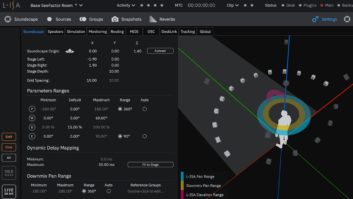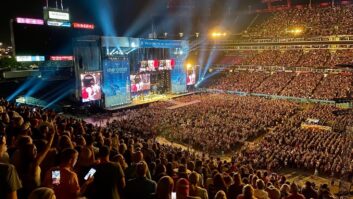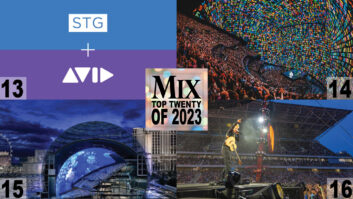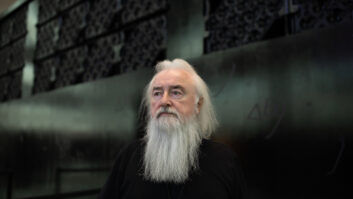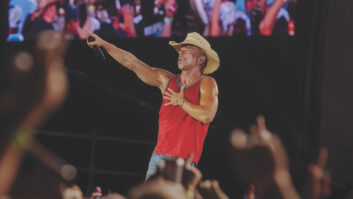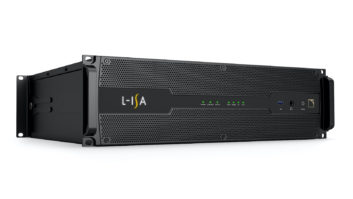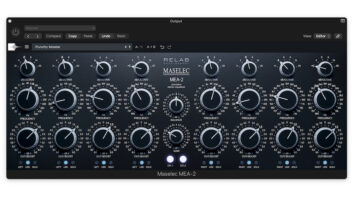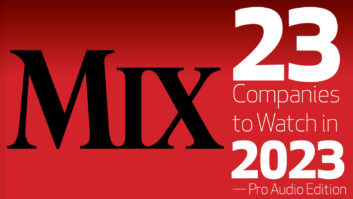by Frank Wells.

In Part Two of our three-part interview with Kenny Chesney, Pro Sound News editor-in-chief Frank Wells sits down with the country star to learn how Kenny balances modern and traditional recording in the studio, what makes his new album, Hemingway’s Whiskey, an artistic departure, and more. (Coming in late? Check out Part 1 on the PSN blog.)
PSN: What are the musical elements or mix elements that you feel makes Hemingway’s Whiskey stand apart from the previous projects?
KC: We took a few extra chances melodically with songs [and as the saying goes] sometimes less is more. But I think with this record I wanted the songs to stick out. I don’t know that I would have cut a song like “You and Tequila” and had Grace Potter sing it with me a couple years ago. I might have, but I don’t know. I felt really comfortable in my skin doing that song and treating it like we treated it. I don’t know if it’s necessarily a twist of the knob that makes this record sound like it does, any different than the other ones. To me, as I hope to the people that are listening to it, it doesn’t sound like I made this record on a treadmill cycle.
PSN: I used to do multitrack tape safeties of tracking sessions in the early mornings at Masterfonics, and in many cases, if you pulled down the lead vocal, you couldn’t tell one act’s album from the next—cookie-cutter country.
KC: Yeah, I’ve done it. I felt like I had invested so much and the fans have and Buddy and I have, and I just wanted this record to be a little different. I wanted it to be a lot different. I wanted to stay true to my fans and people who come to see us live, but I also wanted to push them, and I wanted to push my music and push me as a person, as an artist.
I just think the whole energy of it, of us having time to not feel rushed—we made a record and finished it when we wanted to, not when we were supposed to. I believe that you can tell the difference in the sound
PSN: Justin’s been one of my all time favorite engineers since pretty much the day I met him—after he walked in to my shop and named the band and album I was listening to (relatively obscure British prog rock from the ’70s). He’s a guitar player and brings a musician’s sensibility to the table. He really works to maintain dynamics, to keep the technology out of the music while using technology creatively.
KC: That’s right. And I think you can hear that on records, I really do. Dynamically, I think Justin might be the best. There’s a song on this record called “Seven Days (A Thousand Times)” that is one of the most dynamic songs I’ve ever recorded and there’s a lot of Justin’s influence on that record, in ways that made it what it was.
PSN: You’ve been working with Tony Castle now for quite awhile, too, about six albums?
KC: I’ve worked with Tony for a while. Tony and I have made several [studio] records together; we did one live record together. He and Buddy will come out and we’ll record some shows for my internet radio station, No Shoes [noshoesradio.com, 24/7 Kenny]; we’ll record shows, go in and mix ‘em and put them on the radio station to feed the fan base. Tony and I, we’re constantly working; he’s been a huge part of what’s happened to me in the last several years. Tony’s got all the hard drives so to speak.”
PSN: What does he bring to a session?
KC: Tony and I grew up in the same part of the country; he’s from East Tennessee also. We just understand each other, we’re very comfortable in the studio. He’s very easy to work with and he’s really smart and he’s really good at what he does and he’s quick.
Making records has changed since we were at Masterfonics with Barry. I think even Barry would be blown away by how we make records today. And Tony is, to me, ahead of that curve, that’s why I love having him around.
PSN: In some ways, though, you still work in a traditional fashion—you’re still taking a full band in and trying to get that energy of playing live.
KC: Yeah, we cut pretty live. I’ve been trying to balance my world. I’ve been trying to balance being a creative artist in the studio but also I’m constantly thinking, ‘okay, well how is this going to turn a kid on that was out there in the audience.’ So, when Buddy and I go in with the guys to record, we cut pretty live, we cut with a band.
PSN: So, the way you interact with the session musicians, how you interact with your producer, with your engineer, hasn’t changed. What has changed about the studio experience for you?
KC: Oh, well the technology. We cut this record and the last several at Blackbird and I think that room sounds really good. I’ve been around a lot of guys that make records—and I’m really glad that I don’t do this—but I have literally seen people in other genres make records all on a Mac. I understand it’s cheaper but man, and you hear those records on the radio…
PSN: So even though you’re tracking ‘old school’ with the workstation functioning virtually as a tape machine, there are other aspects of the process where you are using the advanced tools?
KC: Well, for example, you know Rob Hajacos played [fiddle] on my early stuff, right? He’d play throughout the whole song. And the technology, it wasn’t there if I liked something that he played in a certain bar, same key, but he played it later in the song. The technology really wasn’t there to, as quickly as it is now, to say ‘Okay, so let’s move that here.’ And it’s done instantly. Everybody can debate if it’s taken a lot of heart out of the records or not.
PSN: That can depend on how the capability is used. You’ve got Paul Leim drumming, so it’s not like you’re not moving and realigning drum hits.
KC: No, no. One thing for me is I’ve never had to sample drums, thank God.
• • • •
Kenny talks about his studio and live vocal mics, how he chose the songs for Hemingway’s Whiskey and more in Part 3 of our exclusive interview.
